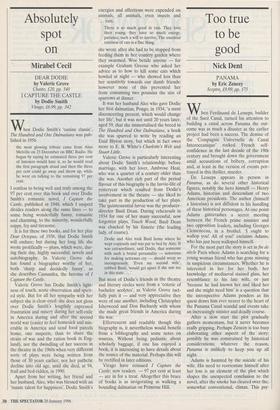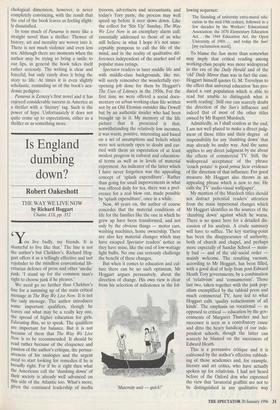Too true to be good
Nick Dent
PANAMA by Eric Zencey Sceptre, £9.99, pp. 375 When Ferdinand de Lesseps, builder of the Suez Canal, turned his attention to building a canal across Panama the out- come was as much a disaster as the earlier project had been a success. The demise of the `Compagnie Universelle de Canal Interoceanique' rocked French self- confidence in the last decade of the 19th century and brought down the government amid accusations of bribery, corruption and, at least in the version of events por- trayed in this thriller, murder.
De Lesseps appears in person in Panama, as do several other historical figures, notably the hero himself — Henry Adams, historian and descendant of two American presidents. The author (himself a historian) is not diffident in his handling of these historical personages. At one point Adams gatecrashes a secret meeting between the French prime minister and two opposition leaders, including Georges Clemenceau, in a brothel. 'I ought to wallop you! All of you!' exclaims Adams, who has just been walloped himself.
For the most part the story is set in fin de siecle Paris where Adams is searching for a young woman friend who has gone missing in suspicious circumstances. Whether he is interested in her for her body, her knowledge of mediaeval stained glass, her resemblance to his late wife, or just `because he had known her and liked her and she might need him' is a question that the introspective Adams ponders as his quest draws him ever nearer to the heart of the Panama Canal scandal and events take an increasingly sinister and deadly course.
After a slow start the plot gradually gathers momentum, but it never becomes really gripping. Perhaps Zencey is too busy elaborating other aspects of the story; possibly he was constrained by historical considerations; whatever the reason, Panama is unlikely to keep you up all night.
Adams is haunted by the suicide of his wife. His need to reorientate himself after her loss is an element of the plot which shapes the unexpected conclusion to the novel, after the smoke has cleared over the, somewhat conventional, climax. This psy- chological dimension, however, is never completely convincing, with the result that the end of the book leaves us feeling slight- ly dissatisfied.
In tone much of Panama is more like a straight novel than a thriller. Themes of history, art and morality are woven into it. There is not much violence and even less sex. Although there are moments when the author may be trying to bring a smile to our lips, in general the book takes itself rather seriously. The writing is clear and forceful, but only rarely does it bring the story to life. At times it is even slightly scholastic, reminding us of the book's aca- demic pedigree.
Panama is Zencey's first novel and it has enjoyed considerable success in America as a thriller with a 'literary' tag. Such is the power of hype. Unfortunately it does not quite come up to expectations, either as a thriller or as something more.



























































 Previous page
Previous page